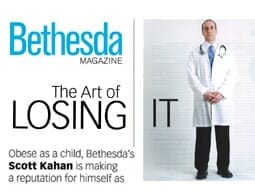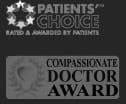Dr. Scott Kahan was nominated for the 2012 Robert Wood Johnson Foundation Young Leader Award by one of his patients who wrote the following nomination letter.
Dear Members of the Robert Wood Johnson Foundation Young Leader Awards Panel:
There are moments in life that are transformative, when we realize that an event or a person or an experience has altered the way we live or think, changing us in ways that we never imagined possible. For me, and for countless others, meeting Dr. Scott Kahan was one of those moments. He has inspired me both personally and professionally, and his leadership and innovation in addressing perhaps the most pressing healthcare need of our time convinces me he will be one of our nation’s greatest healthcare leaders for decades to come. I am honored to nominate Dr. Scott Kahan – a public health and clinical expert whose career is devoted to obesity prevention and treatment – for the Robert Wood Johnson Foundation Young Leaders Award.
Scott’s leadership abilities are truly inspiring. I say this from the perspective of my 30-year career in higher education and as Chief Executive Officer of a national nonprofit organization, during which time I observed the leadership styles and skills of college and university presidents, national policy experts, governing boards, healthcare executives and other senior leaders. Scott Kahan has the skills and personal attributes so needed in the healthcare field as we search for future leaders who can heal patients in need and pioneer solutions to larger health problems affecting our communities. Since early in his career, he has led with innovative and holistic approaches to advance the nation’s health, particularly in the area of obesity. The scope of Scott’s leadership abilities and achievements at the age of only 37 are notable of their own accord, but astounding in their potential future impact on countless lives.
Scott served as the Clinical Advisor, and was recently appointed as Director, of the Strategies to Overcome and Prevent (STOP) Obesity Alliance, a George Washington University-based coalition of 70 organizations devoted to reversing the rising trend in obesity and weight-related health issues. The Alliance works at the community, state, and national levels to advance the conversation about obesity, disseminate effective and sustainable strategies, and educate policy makers, providers, parents and families. The heads of these 70 organizations chose Scott to lead the Alliance in recognition of his ability to marry academic, policy, public health, and clinical expertise. Scott’s new role builds on his proven work as a collaborator on health policy issues while serving the Alliance as its Clinical Advisor, his successful collaborative efforts leading several medical clinics, and his many academic achievements.
Scott describes himself first and foremost as a physician, yet his work at the STOP Obesity Alliance allows him to translate clinical experiences to the population level. As Director of the Alliance, Scott noted in an interview how important “being in the trenches with the people who are struggling with obesity and weight-related chronic disease can be to finding pathways to overcome and prevent these serious and debilitating health conditions on a population level.” He evidences a vigorous, consistent and profound commitment to help this stigmatized and shunned population who face obesity and its many health and social consequences. His goal as Director is to deepen the Alliance’s research into the evolving field of obesity science and find ways to translate what is learned into practical and actionable steps that can help both national decision-makers and individuals alike. He aspires to advance the national dialogue about obesity to focus not on appearance but on a more health-focused definition of success. Scott is constantly striving to connect science with direct patient experience, bring together experts and perspectives from multiple disciplines, and translate the results into a vision that extends to the larger policy community.
Another important aspect of Scott’s work as Alliance Director is bringing parties together to bridge the disconnect between public health experts and doctors in clinical practice, to ensure the dialogue addresses both population health and individual success at the clinical level. I cannot imagine a better person to provide the bridge than Scott Kahan. He has worked alongside and led collaborations among national leaders, Surgeons General, public health organizations, health systems, governmental bodies, media leaders, community leaders, academics, physicians, patients, parents, and others. These are just a few examples of Scott’s strong professional and personal desire to search for the right solutions and to employ every resource available to address a public health matter that is perhaps the greatest challenge of our time.
Scott has been a national spokesperson on health policy and clinical issues related to obesity, including a column in the Huffington Post, an internationally-viewed TED lecture, numerous media appearances including PBS and NPR, numerous testimonies at the state level in Maryland, Congressional briefings, and a presentation at The Atlantic magazine’s Food Policy Summit. He was also elected to the Advocacy Committee of The Obesity Society, the leading national organization that advances scientific understanding about obesity. He is quoted regularly in a large number of print publications and appears often on local and national television and radio, sought out for his extensive expertise on obesity, public health, and prevention.
In addition to his leadership at the national level, scholarship and teaching are high priorities for Scott. From his busy days as a young medical school student to his busy days now as a clinician, clinic director, and public health leader, Scott has always found time to write and to teach. As a medical student, for example, he realized that the massive amount of medical information confronting students and residents was overwhelming. He wanted to provide a resource that streamlined the material to help medical students and residents understand the “big picture” without getting lost in the details. He identified and collaborated with hundreds of medical experts across the country to publish a series of thirteen medical handbooks that provide streamlined discussions of the key diseases in the topical rotation areas of medicine. It was Scott’s brainchild to bring together experts in multiple fields to improve the learning experience for health care professionals – and the impact has been widespread and long-lasting, including translations into nine foreign languages.
Johns Hopkins University Press will publish Scott’s next textbook, called Health Behavior Change in Populations: The State of the Evidence and Roles for Key Stakeholders, which Scott conceived and developed. He also coordinated the contributions of dozens of public health leaders, served as Editor-in-Chief, and authored or co-authored several chapters. With the shift from acute to chronic, often behavior-related, diseases, the textbook is a unique resource that will present evidence-based practices and processes at multiple levels of influence in key areas of public health and health behavior change, including tobacco control, nutrition, physical activity, alcohol, unintentional injury prevention, and violence prevention. It will serve as a textbook for graduate students in public health and the public health workforce. In addition, Scott co-authored a nutrition handbook for physicians, has served as a peer reviewer for more than twenty academic journals, and is frequently asked by NIH panels to serve as a reviewer for research proposals on obesity and diabetes.
A scholar in his own right, Scott is also deeply involved in teaching and training the next generation of health practitioners and academics. He has a joint faculty appointment at the George Washington University School of Public Health and School of Medicine, where he created and taught the first course devoted to obesity and nutrition. He also has a faculty appointment at the Johns Hopkins School of Public Health, where he received his Master of Public Health degree, and where he teaches a core course on Problem Solving in Public Health, preparing students to address public health problems using a systematic problem-solving methodology. He also created and taught the first undergraduate course on obesity at Johns Hopkins. Scott has served as a student advisor for undergraduate, graduate and medical students and has noted the importance of teaching medical school courses to help train future doctors to have a compassionate, scientific and strategic perspective toward helping people with obesity to build an empowered approach to managing their health. What better person than Scott Kahan to teach the doctors of tomorrow about approaches for long-term and sustainable success?
Scott’s impressive professional and scholarly accomplishments alone are worthy of this award, but from my own perspective, what truly sets Scott apart is the way he changes the lives of one patient at a time in his multidisciplinary medical clinic that specializes in obesity treatment. Prior to establishing his clinic, he was Associate Director of the Johns Hopkins Weight Management Center, and then served as Co-Director of the George Washington University Weight Management Program. When it closed for funding reasons, Scott created and implemented a strategy to continue the best aspects of the program and to develop a new and innovative approach to help those who struggle with weight issues. Just this past January, he created and opened the National Center for Weight and Wellness, where he leads a multidisciplinary team of fifteen talented, compassionate practitioners dedicated to the care of patients in a whole-person, collaborative environment.
Each patient at the Center is treated as an individual to be cared for and respected. His innovative approach recognizes that obesity is the result, rather than the problem, and identifies each patient’s confluence of contributing factors leading to weight issues. He brings his team together to address obesity as a multifaceted problem with contributing and compounding factors that manifest themselves differently in each individual. The Center’s approach is to address multiple aspects of patients’ lives through a multidisciplinary approach that integrates a diverse array of health care providers who touch on medical, psychological, nutritional and other issues that relate to weight struggles. Scott’s leadership in development and implementation of this clinic has made a life-altering difference in the lives of the many patients with whom he works. He helps patients to internalize the fundamental importance of their health and well-being, in a way that empowers them to manage their health in a lasting way.
Scott’s early years as an overweight child himself had a significant impact on his life and career choices. As a recent profile of him in Bethesda Magazine noted, he “has never forgotten being overweight and he channels his childhood experiences into lessons he shares with his patients.” The empathy he shows to patients is noteworthy and real. He proudly notes that the experience provides valuable insight into the clinical and social problems his patients face, and he is always happy to share his own personal experiences and struggles to reduce the stigma associated with weight issues and to relate directly with patients.
The tagline of the Center is “where science meets humanity,” and Scott’s clinical approach is the epitome of the phrase. He shares evidence-based science and real-world insight to educate and empower patients in a gentle, compassionate, and productive way that creates the building blocks for success. Humane treatment is the hallmark of the clinic where Scott’s sincere concern for his patients allows him to understand their needs and tailor his approach to their unique situations. In recognition of the Center’s potential impact, Sibley Memorial Hospital and Johns Hopkins Medicine are working with Scott to integrate the Center within its system. It is significant that this nationally known and highly-regarded healthcare system, where Scott trained as a resident, recognizes the value and sustainability of his approach and leadership.
Scott’s credentials, scholarship and experience make him a natural as a leading spokesperson in the area of health policy issues, obesity prevention and treatment, and promotion of healthy lifestyles, but it is his personal style that has made all the difference to me. Scott’s intellectual curiosity is infectious; he meets each patient where they are, contacts and coordinates care with other healthcare providers within and outside his office, suggests valuable resources, and determines what is best for the patient based on what she wants to achieve. He views each patient relationship as a partnership, listening with an ear toward learning what is on their minds and in their hearts, and helping them to heal. Scott’s insight, guidance, and compassion help me personally to navigate health and life challenges in ways that extend far beyond weight.
Ever since I met Scott two years ago, he has been an inspiration both professionally and personally. From a professional perspective, I have learned over the course of my career to identify leadership characteristics and qualities and to know who will likely succeed over time. Scott and I have learned much from each other during our many conversations about leadership. While successful leadership is assessed in multiple ways, he inspires me professionally as a leader because of the lasting impact he has on people’s lives. From a personal perspective, he has helped me to modify my definition of success by focusing on healthy lifestyle behaviors rather than simply weight loss, by seeing me as an individual rather than rushing to a quick judgment of which “diet” to follow, by focusing on the “big picture” of my life instead of one part that is just about food, and by focusing on the positive means to live a happy and healthy life. He wears a multitude of hats in our conversations, from doctor to researcher to counselor to nutritionist to fellow human being. He suggests ways to understand, evaluate, modify and meet life’s daily challenges, doing so with a caring and compassionate style. He cares about what goes on in my life and takes time to understand me as a person, not as a number. He helps me to take control of my life in the one area that has been my greatest struggle, in a way that is comfortable and sustainable. I have not felt this optimistic about my long-term health for many years.
I am but one of the many patients who have had the same experience with Scott and his practice. His patients comment freely about what a difference he has made in their lives, noting that it has been a “life changing journey,” and that he “combines his own experience with a solid foundation in medicine to help patients deal with the frustration and anguish that comes from the battle with obesity.” They note that Scott “connects with me on a human level,” and “taught me to take care of myself with as much patience and nurturing as he shows in taking care of me.” One patient also said that when Scott doesn’t have the answer, he happily turns to his extensive and trusted network of experts for answers – just another example of his desire for collaboration in order to deliver the best patient care. Those who struggle with weight and obesity issues often feel demoralized and stigmatized, having tried to lose weight through various diets over the course of their lifetimes. If there is one clear, consistent theme among Scott’s patients, it is that he is a caring, compassionate partner who changes lives for the better.
Even in the midst of commitments to teaching, writing, advancing health policy, serving as a media spokesperson, directing the STOP Obesity Alliance and his multidisciplinary clinic, it is a marvel that he is one of the most accessible doctors imaginable. A call or email results in a quick response and the mantra of patients is that they always feel better after they see or talk with him. Complicated as life can be, isn’t that what we all hope for in our lives – the knowledgeable perspective and comfort offered by a doctor who cares first about our healing? That is the person I want as my doctor – and as my local, state and national leader: the person who can affect so many lives on a large scale, but who deeply cares about each life, one patient at a time.
Why is Scott Kahan deserving of this award?
- His academic work and scholarship, team approach to patient care, and collaboration and outreach to communities small and large – whether parents, families, students, clinicians, health policy experts, state and national leaders, or the public – evidence his ability to bring groups together in a collective effort for the greater good.
- His creation and leadership of the National Center for Weight and Wellness and his leadership of the STOP Obesity Alliance evidence his combined thinking and action that are making a significant impact on obesity at both the patient- and health policy-levels.
- The books he writes, the classes he teaches, the students he mentors, the many diverse groups and experts he brings together, the multidisciplinary approach to obesity and patient care he created and advances, and the public health and policy initiatives he promotes evidence the transdisciplinary and sustainable impact of his work.
- His creative, collaborative and holistic approach to patient care and his development of medical and public health textbooks, as well as courses related to obesity and public health, evidence his innovation and outside-the-box thinking.
- His bridging the gap between clinicians and health policy experts through the Alliance, his outreach to hundreds of experts to coordinate far-reaching projects, the innovative public health textbook, and the collaborative work at his medical clinic all evidence transdisciplinary understanding and outreach.
- His scholarship and teaching, the development of advanced courses on obesity and public health, and the daily experiences of his colleagues and patients at his clinic evidence his insatiable intellectual curiosity to understand and advance knowledge and care.
- His human qualities as an accessible, caring, compassionate, humane, gentle, insightful, kind and warm person – all words that come directly from patients and colleagues – evidence his deep concern for people and a persistent drive to relieve suffering and fulfill human potential in an area that is in great need of attention and solutions. This is most important to Scott since in the end, our humanity is what unites us as a community and a nation.
From my perspective as a national leader and a patient, the world is a better and brighter place because of Scott Kahan. I am humbled by the inspiration he provides to me and to everyone he touches. It is my honor and privilege to nominate Scott Kahan for the Robert Wood Johnson Foundation Young Leaders Award. Thank you for your consideration.









